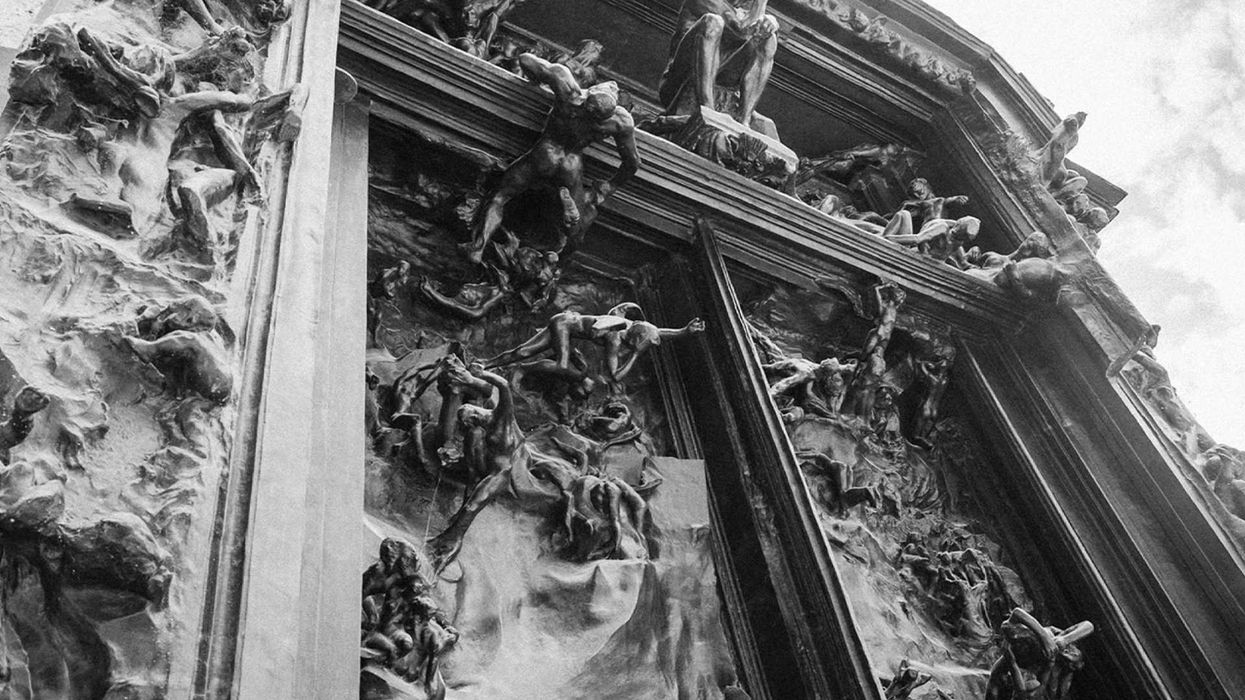
© 2026 Blaze Media LLC. All rights reserved.
An actually banned book makes its triumphant return with a new translation.
Unlike Aldous Huxley’s Brave New World and George Orwell’s 1984, Jean Raspail’s The Camp of the Saints lacks any aura of respectability. In the United States, it is attacked as a bigoted screed, “a must-read within white supremacist circles.” Raspail, who won some of France’s most important literary prizes, is regarded as an outright racist rather than as an accomplished writer. This narrative has stood for years in large part because the publishing houses that owned the rights to the English translation have suppressed the book. That’s why the authorized release of this new edition by Robert Laffont, the French publishing house that owns the original rights, is so important. For the first time in decades, English speakers have unrestricted access to the text, brought to life in Ethan Rundell’s vivid new translation. English-language audiences can now finally understand Raspail’s hypnotic and haunting tale and appreciate why the novel remains of lasting significance.
Huxley’s Brave New World and Orwell’s 1984 show how the assumptions of self-satisfied materialism, far from building a progressive paradise, can underwrite a permanent political nightmare. Describing fully achieved dystopias, the novels capture two sides of modern despotism: one, soft and seductive; the other, hard and brutal. The Camp of the Saints, by contrast, divulges a dystopia as it comes to be. It explores the implications of modern spiritual self-hatred.
The central plot concerns an armada that transports a million migrants from India to the shores of France, throwing the country and the West into chaos. But The Camp of the Saints is not a disaster novel. The book’s importance does not hinge on whether Raspail was correct in predicting mass immigration or in describing it in catastrophic terms. Rather, the novel’s genius lies in the depiction of an apocalypse in the original sense of that term. Properly translated, apocalypse means revelation, disclosure—literally, an “uncovering.” The Camp of the Saints, whose title is taken from the book of Revelation, unveils the perverse logic that pervades late Western civilization, throwing into sharp relief the nihilism of guilt. Too spiritually weak to appreciate their own distinction and to defend themselves, Westerners welcome their own destruction under the guise of creating a perfect world cleansed of their past sins.
The ethic of decolonization trades off the utopian vision of multicultural progressivism, which assumes that everyone in the world can be incorporated into a single rainbow regime. Yet the universalism underlying this project masks its coercive, dystopic dimension. Raspail pulls aside the mask. Multicultural progressivism demands the subjugation and destruction of all traditional forms of life. Its prime target is the West because the engine that drives it is Western cowardice and self-hatred; multiculturalism is the cultural imperialism of European self-loathing. Such impulses are masked by belief in the atoning power of capitulation to mass immigration and the deconstruction of European identity. But Raspail knows the truth: immigrants do not have the power to deliver Europeans from their sense of worthlessness. Once one embraces the logic of civilizational repudiation, the endpoint is nihilism and cultural death. The Alpha is European guilt. The Omega is Eurocide.
Raspail anticipated the double standard that is inextricably linked to multiculturalism. The decolonization paradigm creates a generic, quasi-universal indigenous identity that incorporates the whole world—except for those descended from white Europeans. Group preference—and self-determination—is permissible and encouraged for all groups except them.
That’s why the policies for managing multiculturalism and handling increased ethnic diversity cannot but be asymmetrical. They give ethnic and racial minorities in the West more and more autonomy and power, while subjecting white majorities to ever more intensive surveillance through the proliferation of antiracist laws that are almost exclusively enforced upon them. Progressive multiculturalists are not even satisfied with this double standard. The next step is to render it illegitimate for settlers—for whites—to imagine they have a future. In short, they must disappear.
Multiculturalism and the antiracist games that underwrite it worsen the social fractures and ethnic divisions in Western societies. It’s becoming more mainstream to predict the likelihood of brutal, anarchic civil wars along ethnic lines. Raspail, by contrast, imagines a mostly peaceful submission. In The Camp of the Saints, violence occurs, but there isn’t really an ethnic civil war. The few pockets of resistance are quickly stamped out.
Whether or not Raspail accurately outlined our future, he is a surer guide to understanding the roots of our malaise. Most genealogies of multiculturalism trace its triumph to the West’s relatively recent embrace of cultural Marxism or “wokeism.” The Camp of the Saints raises more fundamental themes. The West’s destruction is rooted in a deep spiritual sickness that leaves it helpless before its enemies:
Two opposing camps. One believes in miracles. The other no longer does. The one that will raise mountains is the one that has kept its faith. It will conquer. Mortal doubt has sapped all energy in the other. It will be conquered.
Sometime during those seemingly good years after World War II—Les Trente Glorieuses, as the French call the period in which The Camp of the Saints was published—the West fattened its body but lost its soul. In a sense, the apocalypse has already happened. That’s why Westerners in Raspail’s novel lack the fortitude to defend their civilization, and why so many find reverse colonization desirable. We live in a civilization that is already damned.
Raspail was concerned to do more than unveil that spiritual death of the West. The Camp of the Saints offers guidance to those of us who hope to save our spiritual integrity as we seek to preserve and honor our patrimony. It shows us how not to act. The novel’s band of resisters, though they are patriots who love their country and culture, are very much part of Raspail’s satire. At best, they practice a simple postwar Epicureanism, appreciating the quotidian pleasures afforded by their country’s prosperity, customs, and culinary traditions. At worst, they lack ethical refinement and display a rough, schoolboy Nietzscheanism. They are lovers of sensual pleasures but they are also lovers of violence. They have only fragments of the real religion. They are Last Men.
The tragic center of the novel is a civilization pulled between two portals of death. On the one hand, there is an eschatological universalism, premised on the unique guilt of one civilization, which makes the collective suicide of the West a spiritual duty. On the other hand, there is a raw particularism, which may animate the community but leaves its members bereft of pity and mercy and so devoid of any authentic spirituality. For Christians, the novel poses a dilemma: Either uphold a natural love of home and country and reject Christianity; or uphold Christianity but reject the natural love of home and country.
Whatever the ultimate theological resolution may be, Raspail’s later works are literary explorations that take us beyond the novel’s dilemma. Just like The Camp of the Saints, these are novels about cultural destruction that imagine what survivors and resisters must do after the catastrophe has occurred. Just like The Camp of the Saints, they describe little platoons of resisters who try to save a culture threatened with extinction, to protect the fragile roots of traditions touched by the deep frost of modernity.
Reading and defending The Camp of the Saints is not unlike enrolling in one of these little platoons. They are acts of defiance, refusals to submit to the stolid conventions and anaemic conformism that dictate the lives of fearful, lesser men. The motive is not mere contrarianism but the realization that a valuable treasure has been subject to unjust calumnies or condemnations and stands at risk of disappearing forever. We act to stop that disappearance from happening and to save our spiritual heritage. The fruits of these battles are elusive. The penalties for standing firm and fighting on are steep. But to suffer them is a badge of honor.
This was adapted from the introduction to the new translation and edition of The Camp of the Saints by Vauban Books and an essay in First Things. You can order The Camp of the Saints on Amazon and vaubanbooks.com.
Want to leave a tip?
We answer to you. Help keep our content free of advertisers and big tech censorship by leaving a tip today.
Want to join the conversation?
Already a subscriber?
Nathan Pinkoski is a senior fellow at the Center for Renewing America.
Nathan Pinkoski
Nathan Pinkoski is a senior fellow at the Center for Renewing America.
more stories
© 2026 Blaze Media LLC. All rights reserved.
Get the stories that matter most delivered directly to your inbox.
By signing up, you agree to our Privacy Policy and Terms of Use, and agree to receive content that may sometimes include advertisements. You may opt out at any time.



